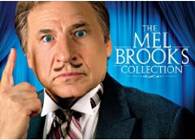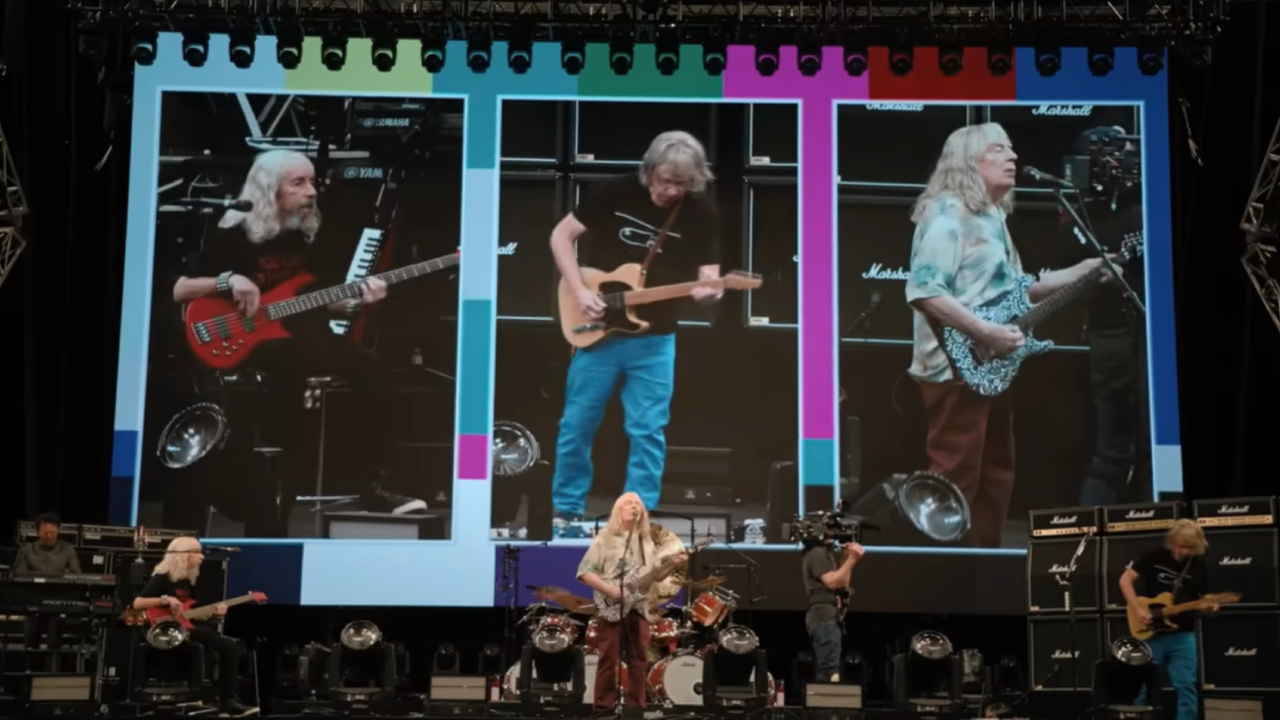It's hard to imagine a more definitive Mel Brooks collection than what Twentieth Century Fox Home Entertainment has put together here. Well, maybe one that included The Producers. Or possible Mel Brooks himself. Either way, I'm having a hard time complaining about a set that includes Blu-ray copies of bona fide classics like Blazing Saddles, Young Frankenstein, and Spaceballs alongside lesser-known but still fun outings such as High Anxiety and Silent Movie. Plus a coffee-table book! We're living in good time for comedy. Judd Apatow's meteoric rise has not only produced several instant classics like 40-Year-Old Virgin and Knocked Up, it's given a wider forum for talented funny people to spin off their own projects like Pineapple Express and Forgetting Sarah Marshall. On the TV front, Arrested Development is still mourned, but we can take comfort in the presence of shows like Community and It's Always Sunny in Philadelphia. But amongst this comedic renaissance, there has been one tragic casualty: the parody film. This once-proud genre decomposes in a ditch by the side of the road, all but forgotten except for the times when the people responsible for the "____ Movie" series come along to pay homage. And by "pay homage," I of course mean "rape brutally."
Yes, it's a sad time for the parody film, and it looks all the sadder when contrasted to this collection of Mel Brooks at his very best (and, admittedly, some of his less-than-best). Tellingly, however, even mediocre Brooks -- I'm looking at you, Men in Tights -- still shows a level of craft, creativity, and fun that makes modern efforts like Meet the Spartans look even more execrable in comparison.
The main attraction of the set is the double feature of Brooks' two best films, Blazing Saddles and Young Frankenstein. While Spaceballs may be just as well known, there's a reason the former two were included on the American Film Institute's list of the top 100 comedies of the last century (at numbers 6 and 13, respectively). What's amazing is just how timeless the two seem even today -- especially when given a shiny Blu-ray makeover. Both are sharp, hilarious, and lovingly detailed take-offs on the genres they're parodying, but what sets them apart as classics is the quality of the writing that ensures that a viewer who'd never seen a single Western or Universal monster movie could still come away thoroughly entertained, even if they didn't catch all the references. Even at his silliest, Brooks and his co-writers took the time to make real characters and stories, however preposterous, rather than just a continuous procession of punchlines and sight gags. It doesn't hurt that both films feature the magical combination of Gene Wilder and Madeline Kahn, an alchemical pairing that has yet to be equaled, and that Young Frankenstein is the second best performance of Wilder's career, topped only by the creepy genius of his Willy Wonka. Even 30 years later, these films haven't aged a day.
Spaceballs was the first exposure many of us had to Brooks growing up (myself included), and that nostalgia helps gloss over the fact that the film hasn't aged quite as well as others. Its humor is still sharp and its satire spot-on, but Spaceballs shows signs of an encroaching silliness for its own sake that knocks the film down a peg or two (a vice that only gets worse in Men in Tights). Still, it's comfort food to many a fan, and its classic moments far outshine its faults ("When will then be now?").
History of the World: Part I is one of Brooks more uneven films. Unfolding episodically over the course of human history, we see everything from the dawn of man (complete with masturbating hominids) to the French Revolution, when it was good to be the king. Some of its bits are among Brooks' best ("I give you the 15 commandments--"
[[ smash ]] "Ten...ten commandments."), and quite frankly the Oedipus one-liner justifies the movie's entire existence if you ask me. However, it drags a bit, primarily during the section set during the Spanish Inquisition, which just never clicks the way the Roman and French Revolution sections do. At the very least, it does what Year One tried and failed to do well enough that you have to wonder why Harold Ramis bothered.
While revisiting old favorites is great fun, the set also provides the opportunity to check out sections of Brooks' resume many fans won't be as familiar with. The Twelve Chairs and To Be or Not to Be are arguably the least "Brooksian" of all the films included, but both are fun in their own way. Based on a satirical novel written by two Russian journalists in the 1920s, The Twelve Chairs is somewhat less madcap than most of Brooks' later films. The story of four men -- a clerk (Ron Moody), a con man (Frank Langella), a priest (Dom DeLuise), and a servant (Brooks) -- in search of a cache of jewels sewn into a dining-room chair is a comedy in the vein It's a Mad Mad Mad Mad World. As the cast chases a dining-room set across Russia, the humor comes from the lengths these characters go to out of greed and the resulting loss of dignity, compassion, and sanity.
Your Daily Blend of Entertainment News
To Be or Not to Be is the only film in the set that Brooks didn't write or direct, but merely stars in. It's also the closest thing to a "serious film" that you'll likely ever see from the man. Not to suggest that the film isn't a comedy, but this remake of a 1942 film about a theater company in Nazi-occupied Poland deals with somewhat heavier subject matter than the usual array of Spaceballs and Frahnk-un-shteens. It's also fascinating to see Mel unleashed as a leading man, and his chemistry with wife Anne Bancroft is delightful. Along with The Twelve Chairs, To Be or Not to Be is one of the only films on the set that I knew virtually nothing about, and the mixture of espionage, satire, and infidelity was a pleasant surprise.
Brooks' attention to detail shines in both High Anxiety and Silent Movie, each a pitch-perfect tribute to their respective genres (those being the films of Alfred Hitchcock and silent movies, unsurprisingly). While familiarity with Hitchcock's expansive body of work is required to catch all the references (and there are a lot of them), High Anxiety is a solid comedy even if you don't know your Birds from your Rear Windows. I'd even say it's better than Spaceballs, though probably only a fraction of the people who have seen that movie have even heard of High Anxiety. Silent Movie, on the other hand, seems to require more of an appreciation of the genre its parodying to get the full effect. It certainly has its moments -- as when the film's only spoken line of dialogue is delivered by famous French mime Marcel Marceau -- but it succeeds more as a technically proficient homage than a laugh-out-loud comedy. Both films are at their best when they riff off the established rules of the genres they're spoofing, such as High Anxiety's repeated camera gags. You don't need to know anything about Hitchcock to laugh when an arty camera angle below a glass table keeps getting obscured by tea pots and plates, or when a zooming camera crashes through a window, inspiring confused gawks from the dinner party inside.
And then there's Robin Hood: Men in Tights. It isn't that it's a bad film, exactly, so much as that it suffers in comparison to what had come before. Brooks set the bar high, and it's a hurdle Tights never manages to clear. Cary Elwes is great fun as a Robin Hood who actually speaks with an English accent, but many of the jokes are so specifically targeted at 1991's Robin Hood: Prince of Thieves that the movie is anchored to a bit of outdated pop-culture nowhere near the front of most of anyone's minds these days. Who knows, maybe it will be relevant again once Ridley Scott's Robin Hood hits theaters later this year. First off, it continues to amaze me how good decades-old films can look when cleaned up for Blu-ray. A 30-year-old comedy will obviously never look as good as a modern big-screen epic tailor-maid for high-def, but all these films look great on Blu-ray.
Nor does the set disappoint on the special-features front. Unsurprisingly, the better-known movies get the most attention, with Blazing Saddles, Young Frankenstein, and Spaceballs all full to bursting with extras. Brooks contributes commentaries on those three, and the commentaries are all excellent. Brooks is naturally charming, perfectly balancing behind-the-scenes anecdotes with technical explanations and frankness about things he wishes went better. Commentaries on comedies are often just excuses for the cast to sit around and socialize -- entertaining in its own right -- but Brooks' chats are thankfully more substantial than that. This is a set that leaves you with the impression that Mel would be an awesome dinner guest, but since most of us will never get that chance, his commentaries are a nice substitute.
The rest of the extras are the usual mix of featurettes, deleted scenes, and outtakes spread across nine discs. Blazing Saddles packs in a behind-the-scenes featurette, deleted scenes, a short documentary about Madeline Kahn, and even a TV pilot for Black Bart, a proposed spin-off series. Young Frankenstein's line-up is even more impressive, with a whopping four featurettes dedicated to various aspects of the film, Brooks' commentary, deleted scenes, an isolated score track, a trivia track, outtakes, and more. The outtakes in particular are worth watching just to see Gene Wilder attempt to make it through the "Igor, help me with the bags" scene without cracking up.
Spaceballs continues the trend, with a making-of feature, a 20-minute interview with Brooks and co-writer Thomas Meehan discussing the movie's origins and production, and a featurette remembering John Candy. If you're still craving more, you can browse still galleries, chuckle at continuity errors in "Film Flubs," watch storyboard-to-film comparisons, and even watch the entire movie in ludicrous speed (it takes just under 30 seconds, and it never goes to plaid).
Silent Movie and High Anxiety each get a featurette and a trivia track alongside a collection of trailers, plus High Anxiety sports an isolated score and a "Am I Very, Very Nervous?" test, which is always good to know. History of the World one-ups them with two featurettes on top of the trivia and isolated score tracks. To Be or Not To Be couples the increasingly popular one-two punch of trivia and score tracks alongside a pair of short documentaries looking at the relationship between Brooks and Bancroft and the fact that To Be was an usually serious outing for Brooks. Robin Hood: Men in Tights gets more attention than it probably deserves with two featurettes and an isolated score alongside a Brooks commentary recycled from the laserdisc. Unsurprisingly, The Twelve Chairs gets short shrift, with no special features other than a collection of trailers.
On top of all that, the snazzy slipcase also comes with an even-more-snazzy coffee-table book about Brooks' life and career. At 118 pages, it's a fun and breezy read filled with stills and makes a perfect capper to an already-expansive set.
Honestly, the only thing keeping this set from getting a five-star rating for the extras is the fact that not every movie is as well represented as Saddles, Frankenstein, and Spaceballs. That's nitpicking of a high order, however, and there's no question that this set should be a no-brainer purchase for any Brooks fan with a Blu-ray player.

